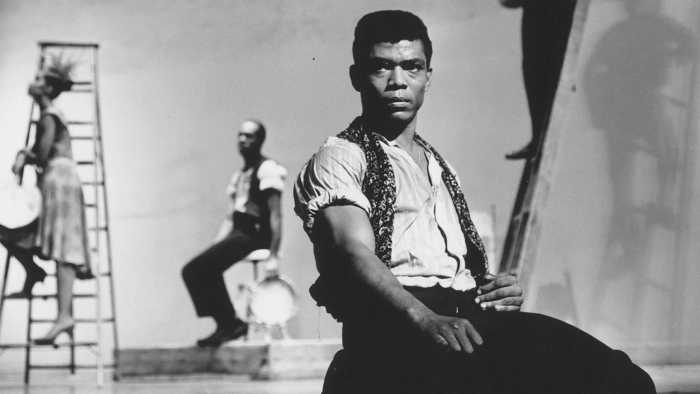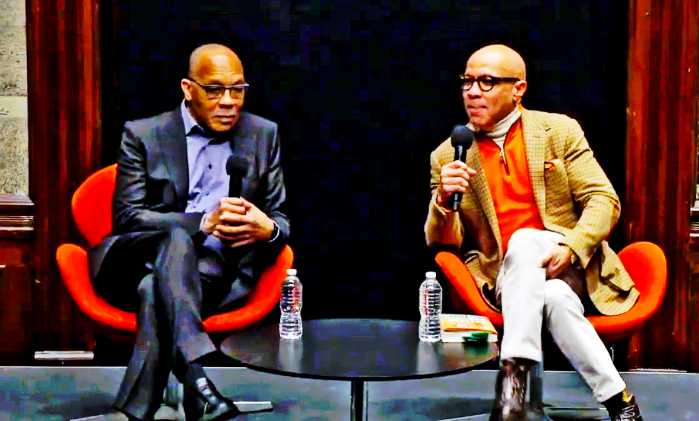Made during the pandemic, the poignant drama, “Language Lessons” gets off to a rocky start as Adam (Mark Duplass, who also cowrote) is surprised by his husband Will’s (Desean Terry) gift of 100 one-hour Spanish lessons. His initial reaction is shock, and he is reluctant and overwhelmed by the gift. The teacher, Cariño (Natalie Morales who directed and cowrote), is patient as Adam tries to communicate with her in Spanish and makes a very amusing error when he says a word en Español that has a very different meaning en Inglés than what Adam intended. Viewers who are similarly patient will come to enjoy the exchanges between Adam and Cariño, which range from amusing to revealing to heartfelt.
The film, which unfolds as a series of video chats, is about the emotional connection that develops between these two strangers whose lives would probably not intersect otherwise. Adam, who grew up poor, is now wealthy, living in a fabulous home in Oakland with his husband, while Cariño is eking out life in Costa Rica. He is seen on the videos in his swimming pool, his bedroom, his sauna, or his gym. In contrast, Cariño has a more modest background. She tries to teach one class while walking through the tropical rainforest and often talks to Adam from her hammock.
The conversations are meant to be immersive, and title cards before each lesson hint at the subjects — context, grammar, etc. — to guide viewers as to the focus of the sessions. Shrewdly, the film drops the characters and viewers right into the lessons. Cariño does not provide much of her background to Adam. However, he is very forthcoming about his life, possibly crossing the line in this teacher-student relationship. Whereas she makes efforts to keep the relationship professional, he soon comes to see her as a friend and confidante. Herein lies some of the film’s magic; viewers understand the dynamic between these characters and generally make the same assumptions Adam does about Cariño based on the information he receives during their messages and interactions. It is a deliberate approach and one that speaks to some of the more critical issues the film raises about privilege as when Adam tries to help Cariño, and she perceives his largess as “rich white savior guilt.”
“Language Lessons” develops the connection between Adam and Cariño quickly, as a tragic event early in the film prompts the pair to temporarily suspend their professional relationship and trade messages that express care and concern. Their conversations are engaging and grow more compelling as the film progresses. Adam talks about his meeting Will, while Cariño slowly reveals details from her life. One exchange takes place with Cariño’s video turned off — she has faulty internet — but then accidentally reveals something that gives Adam reasons for concern, escalating the film’s drama.
The series of encounters are all cleverly handled, and Morales takes advantage of the teleconference sessions without making them feel contrived or gimmicky. There are moments where the videos hiccup or freeze briefly, which lends a sense of realism to the scenes. And while there are limitations to the medium, the format works well to create intimacy. (John G. Young’s “bwoy,” from 2016, similarly depicted a romance between two men over Skype) “Language Lessons” often films the actors in close-up and that forces Morales and Duplass to project considerable emotion, especially during some of the more intense and dramatic moments.
The two performers — the only actors to appear on camera — rise to the challenge of the approach by delivering carefully modulated performances. As Adam, Duplass gets to do some emoting and mugging for the camera, but he also wears his heart on his sleeve as his interest in Cariño deepens. Morales is much more (and appropriately) restrained, providing a good foil for Adam, balancing his more effusive qualities with her calm reserve. A sequence where a drunk Cariño calls Adam in the middle of the night to wish him a happy birthday allows the actress-director to show some range without giving too showy a performance.
The different plot points that come out in each session do build to a climax, and if some of them feel obvious or simplistic, that is not necessarily a drawback because the bond between Adam and Cariño feels real — which is why the film works. That said, perhaps the most interesting moments show the characters alone on camera as they leave video messages or absorb what the other has just said during a session that has ended. There are hints of their personalities that shine through as boundaries are set, or tested, or ignored.
“Language Lessons” is about navigating an online relationship and the value of making an unexpected connection. Morales’ pleasing film is not deep, but it is satisfying.
LANGUAGE LESSONS | Directed by Natalie Morales | Opening September 10 | Distributed by Shout@ Studios



































